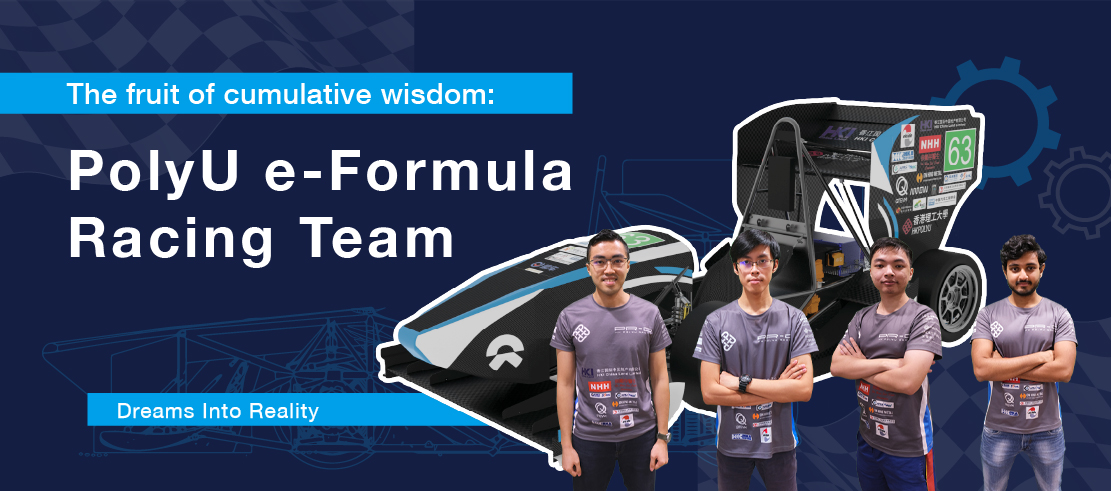Among the members of The PolyU E-Formula Racing Team, “Why this, but not that?” may be the question most frequently raised among members of The PolyU E-Formula Racing Team. Since the establishment of the team in 2015, members have been asking this in workgroups, at meetings, day and night. How collective wisdom led to their first complete autocross run in 2019 is one fascinating story.
In every race season, the racing team has to design, manufacture, test their new formula student car, and be technically and logistically ready to participate in Formula Student Competition.
The team has a steep learning curve and an extremely tight schedule on race car components design, as well as devising solutions for a countless number of problems. Team members hope the design of their racer could be even more creative and innovative. However, innovation and practicality are two parallel lines. Innovative designs may not always be practical. Hence, the sub-teams need to discover the problems then find the cause of them. Members would share all of their thoughts and possible solutions among teammates, senior members and team advisor, discuss together. Eventually, a better idea or design would be reached.
Difficulties? Definitely a lot. Perhaps the most challenging one is to balance academic and racing team workload within the given deadlines.
And more importantly, in such a team with more than 45 members with over 25 international members, the most crucial task is to make sure the connection and communication between its many sub-teams are smooth and effective.
Formula SAE (FSAE) and Formula Student China (FSC) are international collegiate design and manufacture competitions about automotive engineering for undergraduate and graduate students. They are often referred to as the cradle of automotive engineers. FSAE/FSC are held globally each year in 5 continents in over 13 countries with over 570 teams worldwide. The competition promotes careers and excellence in engineering design and project management skills as it encompasses all aspects of the automotive industry including research, design, manufacturing, testing, developing, marketing, management, and finances.

Mr Ng Chun Yin Michael
Vice Captain, PolyU E-Formula Racing Team 2020
BEng (Hons) in Mechanical Engineering
Faculty of Engineering
Mr Tam Chun Yiu Brian
Captain, PolyU E-Formula Racing Team 2020
BEng (Hons) in Mechanical Engineering
Faculty of Engineering
Mr Loong Cheng Sheng
Vice Captain, PolyU E-Formula Racing Team 2020
BEng (Hons) in Mechanical Engineering
Faculty of Engineering
Mr Karan Patel
Deputy Technical Director, PolyU E-Formula Racing Team 2020
BEng (Hons) in Mechanical Engineering
Faculty of Engineering
Entrepreneurship & Lifelong Learner
"Adapting the failure, accepting the failure, not letting the failure become a habit for me and preparing the failure. There’s always mistakes in real life. We cannot let the mistakes fill up our feelings. What we can do is to avoid those mistakes next time. However, sometimes there are unavoidable deviations between manufacturing and designing. Since we knew that would happen even though we have tried to close the gap between manufacturing and designing, we will have to prepare some plan B’s to adapt to those mistakes."
Mr Loong Cheng Sheng
Innovative Problem Solver
"Planning and research is the key. At the beginning of the season, they should construct a milestone plan, determine their design, manufacturing and testing period. At the same time, do a lot of research in order to enrich the knowledge required on technical design or team management as soon as possible, including reading reference books and papers, seeking advice from alumni members, team advisors or even other teams in the competition."
Mr Tam Chun Yiu Brian
Professional Competence
"I have had the privilege to learn some basic working principles within some of the relevant industries. One of the most prominent would be the manufacturing industry, where I was able to learn how to professionally communicate with manufacturers regarding the production of a particular component. We were also lucky enough to have massive support from the Industrial Center throughout the seasons,as they have been able to help us by providing facilities, advice, equipment and also promote our team to potential sponsors."
Mr Karan Patel
Teamwork
"I would emphasize that PolyU Racing Team is a continuous team, and it always has more knowledge and experience accumulated year by year, and it makes a lot of mistakes at the same time. In order to make the team keep advancing, I strongly encourage the newcomers to never feel shame to ask questions as you must have plenty of it when you pick up the tasks. Meanwhile, me and all senior members will always stress that we are always willing and waiting to provide assistance to you."
Mr Loong Cheng Sheng
The pursuit of knowledge is a lifelong journey! To further expand your knowledge and continue your personal and professional growth. Click and explore the following learning resources:
Manufacturing Processes and Design Analysis
Sponsorship and Financial Management
Critical Thinking and Problem-solving
Continuous Improvement and Learning from Mistakes
Project Management and Teamwork
Communication and Presentation Skills
Resourcefulness and Adaptability to New Contexts